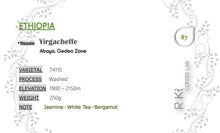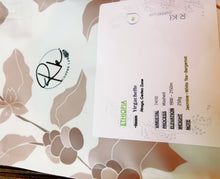Coffee Background
Foge is a municipality located near the center of the coveted Gedeo Zone—the narrow section of highland plateau dense with savvy farmers and fiercely competitive processors whose coffee is known the world over as “Yirgacheffe”, after the zone’s most famous district. The Gedeo Zone is named for the Gedeo people who are indigenous to this area. As a coffee terroir, Gedeo, or “Yirgacheffe”, has for decades been considered a benchmark for beauty and complexity in arabica coffee. It’s known for being beguilingly ornate and jasmine-like when fully washed, and seductively punchy and sweet when sundried, and hardly requires an introduction.
The Foge coffee washing station, is in the district of Yirga Chefe itself, though it works with smallholders in the adjacent Abaya district (just outside the Gedeo border) as well, who are considered part of the local community. Private processors here will often attempt to collaborate with select communities to keep the coffee traceable and the terroir focused. In this case, the washing station is managed by Ms. Rosa Defo, a committed local entrepreneur born of a coffee producing family herself and dedicated to creating jobs for as many area citizens as possible. The station employs 12 people year round, and more than 250 more during harvest months to manage the day to day processing tasks. Foge provides long-term housing for employees and quality premiums to farmers delivering the best cherry possible.
Fully washed processing at Foge includes a hand-sort prior to depulping, and a 36-hour fermentation. Once fermentation is complete the parchment is soaked in fresh water and agitated until the mucilage is fully removed, and then it is moved to raised beds to dry for up to 12 days. During the drying state the parchment is stirred and rotated frequently to avoid uneven moisture buildup and reduce all chances of spoilage. Once fully dried, parchment is moved to a central dry storage facility to let the moisture and water activity equilibrate and give the coffee some rest prior to quality analysis. Finally, the cured parchment is transported to Addis Ababa for final milling and export.
Private processors like Foge are admirable businesses. It’s tough being a private processor in Gedeo, as the sheer density of competition among washing stations tends to push cherry prices as high as double throughout a single harvest, and privates often don’t have the backing of a larger union to secure financing, regulate cherry prices, or bring export costs down with centralized milling and marketing. Successful private washing stations like Foge, then, need to be not only standout quality processors to stay afloat; they must also be excellent business developers with connections and community standing, in order to continue winning the business of farmers and buyers alike, and stay afloat for the long term.




